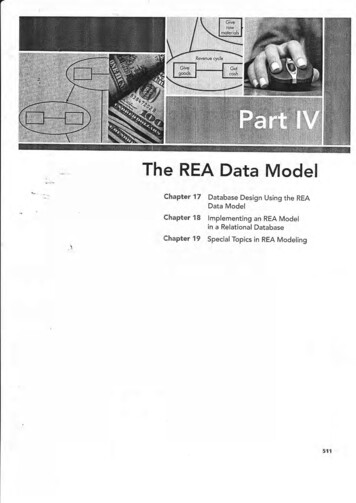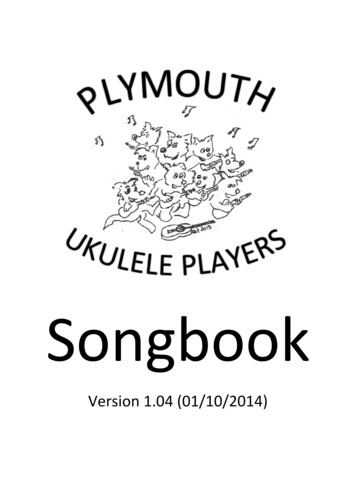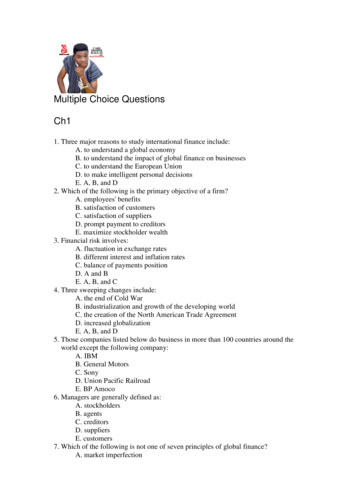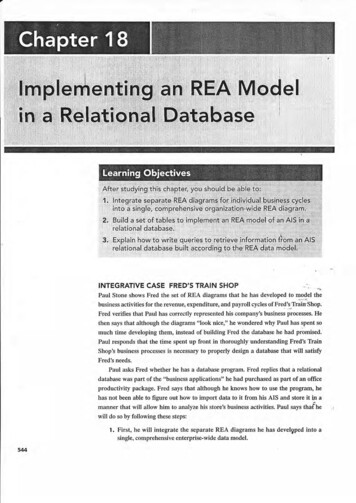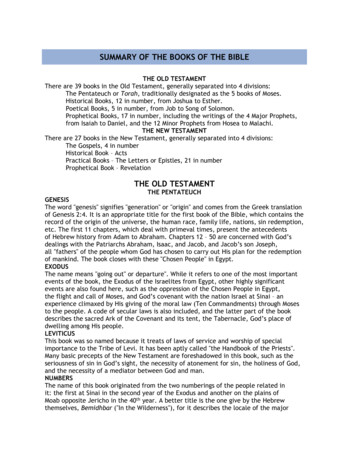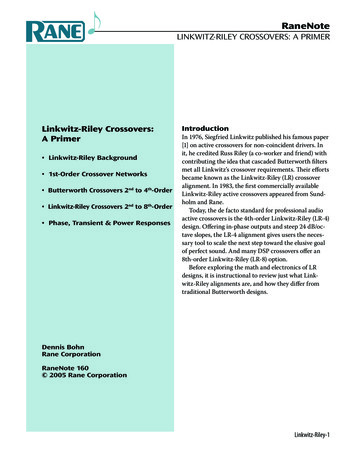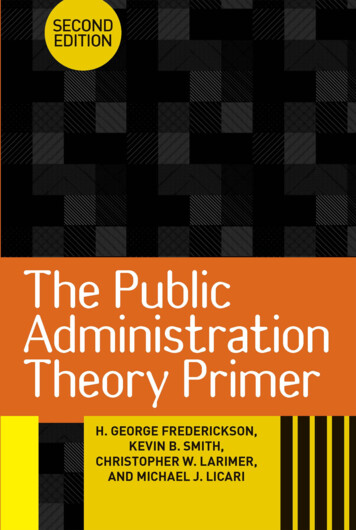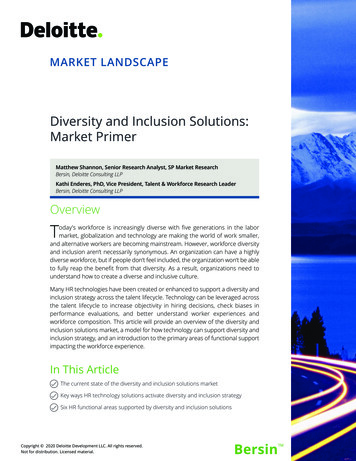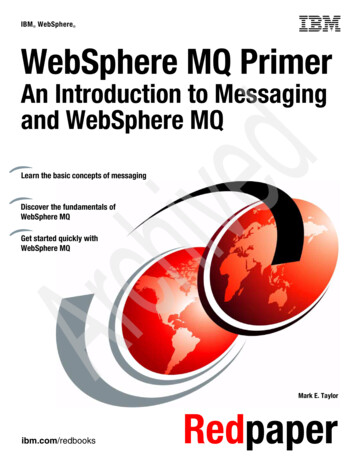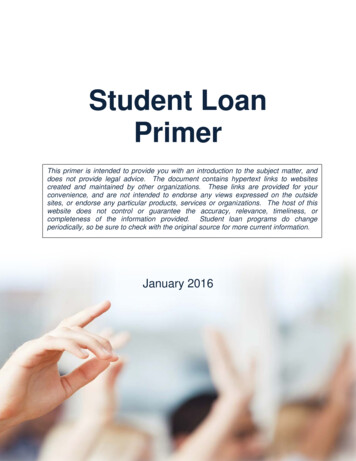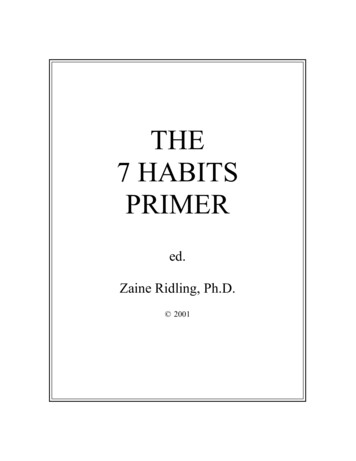
Transcription
THE7 HABITSPRIMERed.Zaine Ridling, Ph.D. 2001
THE 7 HABITS PRIMERTABLE OF CONTENTSThe 7 Habits Primer1General Articles22Change Management50Communication52Leadership Development55Learning69Organizational Development93Personal/Individual Effectiveness116Teams136Time and Life Management138Quality142Family148
THE 7 HABITS PRIMERLife is short. So live love learn and pay it forward. I seek meaningful experience throughmindfulness each day, to walk peacefully within myself, to win the respect of intelligent peopleand the affection of cats, to earn the appreciation of honest critics and endure the betrayal offalse friends, to enjoy art and beauty, to find the best in others, to leave the world enrichedthrough my contributions, and to know that others have lived easier because of me.1. BE RESPONSIBLE. BE PROACTIVE. THE HABIT OF PERSONAL VISION.I have the ability to choose my own response. I carry my own weather – whether it rains or shinesmakes no difference to me. See the world with new eyes by knowing that my honor is greaterthan my moods. BY GROUNDING my emotional life not on the moods or weaknesses of others,but upon my self-chosen values, my behavior is a product of my own conscious choices based onprinciples, rather than a product of my conditions, based on feelings. Focus time and energy onthings I can control (circle of influence) in lieu of reacting to or worrying about conditions overwhich I have little or no control (circle of concern). In so doing, I become RESPONSE-ABLE. Andby practicing this habit, who I am is not determined by what happens to me, but by how I chooseto respond to it.2. BEGIN WITH THE END IN MIND. THE HABIT OF PERSONAL LEADERSHIP.Without VISION, I diminish. All things are created twice: the mental or first creation, and thephysical or second creation. The second creation follows from the first, just as a building followsfrom a blueprint. If I fail to develop my own SELF-AWARENESS and become responsible for firstcreations, I empower other people and circumstances to shape my life by default. So begin eachday with the blueprint of my deepest values firmly in mind. Then as challenges come, makedecisions BASED on those values. The busiest people are often the least effective; BUSYNESS iscommon to those trapped in Q1 & Q3 instead of Q2, where Habits 1,2, 3 are grounded. Lead alife centered on the principles of QUALITY, patience, authenticity, WONDER, mindfulness, selfknowledge, and comport myself as an archetype gentleman scholar.3. PUT FIRST THINGS FIRST. THE HABIT OF PERSONAL MANAGEMENT.The key is to schedule my priorities, not to prioritize my schedule. Therefore, do the importantthings first – because where you are headed is more important than how fast you are going. SAYNO TO THE UNIMPORTANT, no matter how urgent, and yes to the important. Also, don'tconfuse the vital for the important: money (or whatever) might be vital, but one need not make ittheir whole life. Remember that frustration is a function of our expectations, not our realizations.So trade crises for progress by focusing on things that are truly important. When I put first thingsfirst, I don't just do things differently – I do DIFFERENT THINGS.4. THINK WIN-WIN. THE HABIT OF INTERPERSONAL LEADERSHIP.[Relationships start here.] Win-Win is a belief in the Third Alternative springing from anabundance mentality. It's not your way or my way; it's a better way; a higher way. Character is thefoundation of win-win which is comprised of integrity, ABUNDANCE mentality, and maturity. WinWin is the attitude of seeking either mutual benefit or being able to say no deal. Life is best livedcooperatively, not competitively. Everyone I meet is my mirror, thus it is easier to be caring thanhostile. My friends are all around me; I just haven't met them all yet. Difficult people can be mygreatest teachers for what I need most at that moment.1
5. SEEK FIRST TO UNDERSTAND, THEN TO BE UNDERSTOOD.THE HABIT OF COMMUNICATION.[Relationships succeed here.] To fully, deeply understand another is to listen with the eyes andthe heart, which inspires openness and trust. Give others PSYCHOLOGICAL AIR by listening tounderstand their perspective, avoiding autobiographical responses, and by letting them finishtheir sentences. Empathic listening within the other's frame of reference opens me to beinfluenced. The paradox is that in order to have influence, I must first be influenced. HUMBLEmyself by acknowledging that I can be unenthusiastic, impulsive, undisciplined, pessimistic, andan impatient listener. Then strive to transform those same weaknesses into strengths. Always beloyal to the absent – always. Like food, less talk is actually more.6. SYNERGIZE. THE HABIT OF CREATIVE COOPERATION/TEAMWORK. POTENTIAL.[Relationships flourish here.] Synergy is the culmination of all the previous habits. Synergy usesdifferences to build unforeseen strengths. Left to our own experiences, we constantly suffer frominsufficient data. Compromise, which seeks only an end, is 1 1 1½, whereas synergy, whichseeks a new beginning, makes 1 1 3, 4, or more. Value differences (respect them!) to build onstrengths and compensate for weaknesses. Different perspectives INFORM my knowledge andexpand my experience. This is done by realizing that people see the world not as it is, but as theyare [conditioned to see it]. Be sensitive to others' mental maps (paradigms) which have beenconstructed to this point in their life with their own experiences.7. SHARPEN THE SAW. THE HABIT OF SELF-RENEWAL.Spend one hour each day renewing and enhancing the greatest asset I have – myself – throughthe physical, spiritual, mental and social/emotional dimensions of my nature. Success has twosides: production capability (PC), and production (P). Without the renewal of PC, P begins todiminish, and eventually perishes. RECOGNIZE my strengths daily, reaching for new ones.REMEMBER what is important in life is learning, health, purpose, conformity to my ownuniqueness, temperance, and inner peace. Learning will always return meaning and energy to myeffort, so I'm never alone with a great book.2
In Brief:1. BE PROACTIVEI am responsible for my choices and have the freedom to choose.I am responsible of my behavior and the choices I make.I can expand my personal freedom and influence through being response-able.Recognize reactive triggers, increase my circle of influence, become a transitionperson and exercise the four human endowments.2. BEGIN WITH THE END IN MINDMental creation precedes physical creation.I can choose my future and create a vision of it.I will create results mentally before beginning any activity.3. FIRST THINGS FIRSTEffectiveness requires balancing important relationships, roles, and activities.Things which matter most should never be at the mercy of things which matter least.Focus on Quadrant II and plan weekly; implement daily, based on my mission.4. THINK WIN-WINEffective relationships require mutual benefit.I seek the benefit of others, as well as my own.I get better results by cooperating interdependently than competing independently.Balance courage with consideration and persist in looking for win-win outcomes.5. SEEK FIRST TO UNDERSTAND, THEN TO BE UNDERSTOODDiagnosis must precede prescription, and understanding comes through listening.Assume I don't fully understand and by listening first, I'll be better understood.Use empathic listening from the other's frame of reference.6. SYNERGIZEThe whole is more than the sum of its parts.I value the differences in others and seek the Third Alternative (a cooperative solutionreached in a win-win spirit that all parties feel good about).Working together cooperatively takes time but produces better long-term results.Use the synergy ground rules (win-win mentality; open mind; value differences)and apply habits 4 & 5.7. SHARPEN THE SAWProduction (results) require the development of Production Capability (resources).I will continuously improve and renew in the four dimensions of life.Set and achieve goals for personal P/PC balance.FOUNDATIONAL PRINCIPLESP/PC BalanceParadigms; See Do GetMaturity ContinuumWork from the Inside OutTrust is a balance of character and competenceAll systems are perfectly aligned to get the exact results they deliver.3
An Introduction to the 7 HabitsThe 7 Habits of Highly Effective People provide a holistic, integrated approach to personal andinterpersonal effectiveness. Habits are patterns of behavior that involve three overlappingcomponents: knowledge, desire, and skill. Because these three components are learned ratherthan inherited, our habits are our second nature, not our first. Thus, we are not our current habits.We can make or break our habits.PrinciplesPrinciples are guidelines for human conduct that are proven to have enduring, permanent value.They're fundamental. They're essentially unarguable because they are self-evident. Just as thereare natural laws such as gravity which govern the physical dimension, principles are natural lawswhich govern the human dimension.Examples of principles in the human dimension include fairness, out of which the whole conceptof equity and justice is developed. Also, integrity and honesty, which create the foundation oftrust. Another principle is service, or the idea of making a contribution. Another is quality orexcellence. Principles surface time and time again, and the degree to which people in societyrecognize and live in harmony with them moves them toward either survival and stability, ordisintegration and destruction.The 7 Habits of Highly Effective People embody many of the fundamental principles of humaneffectiveness. These habits are basic; they are primary. They represent the internalization ofcorrect principles upon which enduring happiness and success are based. Before reviewing the 7Habits we explain a few foundational principles to help you better understand the habits.The Two Sides of SuccessAesop's fable "The Goose and the Golden Egg" is the story of a poor fanner who one day visitsthe nest of his goose and finds at her side a glittering golden egg. Though he suspects it to be atrick, he decides to take it home, where he learns, to his delight, that the egg is actually pure gold.Every morning thereafter the fanner gathers one golden egg from the nest of the goose and soon4
becomes fabulously wealthy. As he grows rich, however, he also grows greedy and impatient withthe output of the goose. Finally, in an attempt to get at once all the gold in the goose, he kills andopens it, only to find nothing.The moral of this fable has a modern ring to it. True effectiveness is a function of two things: whatis produced (the golden eggs) and the producing asset, or capacity to produce (the goose). Likethe foolish farmer, we often emphasize short-term results at the expense of long-term prosperity.Effectiveness lies in the balance – what we call the P/PC Balance: "P" stands for production ofdesired results, the golden eggs. "PC" stands for production capability, the ability or asset thatproduces the golden eggs. Excessive focus on P results in ruined health, worn-out machines,depleted bank accounts, and broken relationships. Too much focus on PC is like people who runthree or four hours a day, bragging about the extra ten years of life it creates, unaware they arespending them running. Or a person endlessly going to school, never producing, living on otherpeople's golden eggs – the eternal student syndrome.In spite of the obvious need for balancing P and PC, we frequently neglect and abuse physical,financial, and human resources. For instance, we don't properly maintain our bodies, theenvironment, or our valuable physical possessions. We raid principal to increase our standard ofliving. Of greater concern, we overlook relationships, neglecting kindnesses and courtesies. Thus,the goose's health suffers and threatens the production of golden eggs.On the other hand, PC investments (i.e., professional development activities, exercising andeating properly, increasing skills, maintaining and repairing assets, developing relationships)contribute to our quality of life. Relationships are stronger, finances are more secure, andphysical assets last longer. The goose – happy and healthy – continues producing.The P/PC Balance is validated in every arena of life. We can work with it or against it, but it'sthere. It's the definition and paradigm of effectiveness upon which the 7 Habits are based.ParadigmsThe astronomer Ptolemy defined the earth as the center of the universe in a perfectly harmonioussystem. Breaking with this view, Copernicus fixed the sun at the center, which had far moreexplanatory power. By changing his perception of the center of the universe, Copernicusexperienced a Paradigm Shift. Before we can really understand the 7 Habits, we need tounderstand our own paradigms and how to make a Paradigm Shift. The word paradigm wasoriginally a scientific term, and is more commonly used today to mean a model, theory,perception, assumption, or frame of reference. In the more general sense, it's the way we see the5
world, not in terms of our visual sense of sight, but in terms of perceiving, understanding, andinterpreting.A simple way to understand paradigms is to see them as maps. Assume you wanted to arrive at aspecific location in central Chicago. But suppose you were given the wrong map. Through aprinting error, the map labeled Chicago was actually a map of Detroit. Can you imagine thefrustration and ineffectiveness of trying to reach your destination?You might work on your behavior – you could try harder, be more diligent, double your speed. Butyour efforts would only succeed in getting you to the wrong place faster. You might work on yourattitude – you could think more positively. But having a positive mental attitude still wouldn't getyou to the right place. The point is, the fundamental problem has nothing to do with your behavioror attitude. It has everything to do with hav
The 7 Habits of Highly Effective People provide a holistic, integrated approach to personal and interpersonal effectiveness. Habits are patterns of behavior that involve three overlapping components: knowledge, desire, and skill. Because these three components are learned rather than inherited, our habits are our second nature, not our first .
